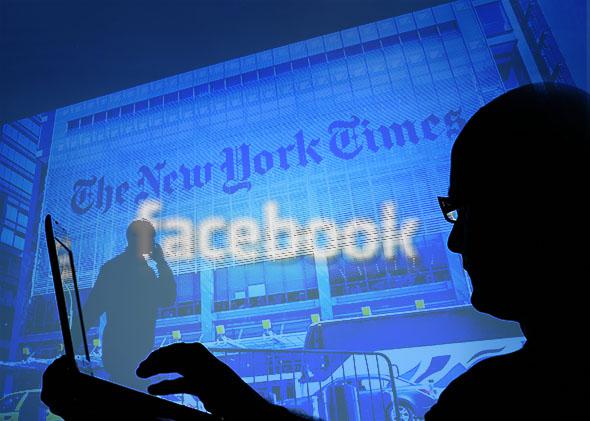Facebook’s plan to take over the media was first articulated in October, by the New York Times’ David Carr. The social network had become a dominant source of online news for its billion-plus users. But it found that those users were frustrated by the experience of reading news on Facebook, especially on their phones. It required clicking links to third-party media websites, whose pages were slow to load, riddled with ads, and often failed to match the promise of their clickbait headlines.
Facebook has tried to solve this problem from a number of angles, many of which I’ve written about in the past. But the ultimate solution was the one Carr laid out: Facebook would simply host news’ sites content on its own platform, then share a slice of the ad revenue that resulted.
I wrote in depth in January about Facebook’s plan to cut out the middle man, explaining how it might work and why publishers would feel compelled to participate. At the time, Facebook had just published a blog post encouraging publishers to post videos natively on its platform, so that they could play automatically in users’ feeds. (Facebook’s algorithms heavily prioritize native video posts over, say, YouTube videos.) But I predicted that we’d eventually see Facebook nudge media outlets to post full news stories directly to Facebook as well—perhaps by “late 2016.”
That prediction suddenly looks far too conservative. The Times reported on Monday that Facebook “has been quietly holding talks with at least half a dozen media companies about hosting their content inside Facebook rather than making users tap a link to go to an external site.” And it will start testing the new scheme “in the next several months,” with the New York Times, National Geographic, and BuzzFeed among the likely partners at launch. No doubt others will be lined up to follow their lead.
Skeptics are howling that this is a Faustian bargain—that the media are mortgaging their long-term futures for short-term gain.
At Fusion, (Slate contributor) Felix Salmon warns that news sites risk sacrificing their brands—and, in the process, their incentives for accuracy and editorial judgment—by handing Facebook control of their distribution. John Battelle holds up the rise and fall of Zynga as a warning to publishers who would build their business around Facebook. The Times’ own Mat Yurow has compared the news industry’s position today to that of the record industry in 2003. That’s when Steve Jobs approached the major labels about selling their music through Apple’s own platform. “This is the publishing industry’s iTunes moment,” Yurow wrote. “And we’re blowing it.” (Yurow’s views, he noted, do not reflect those of his employer.)
It’s easy to see why BuzzFeed would go along with this. Unlike most news sites, BuzzFeed doesn’t make money by running ads alongside its stories but by creating custom ads that are essentially stories in their own right. Its strategy has always been to distribute these ads on platforms other than its own website.
Less widely understood is why publishers like the New York Times and National Geographic would jump at a Facebook deal. In short, Facebook has presented the news media with a collective-action problem.
News sites aren’t blind. They know it would be bad for them to cede control of their content—and, by extension, their relationships with readers and advertisers—to Facebook. And so if they could all get together and decide, as a group, what to do about Facebook, no doubt they’d think long and hard about the long-term sacrifices elucidated by Salmon, Battelle, and Yurow.
But news sites don’t function as a collective. On the contrary, they operate as rivals for the same audiences and advertisers. And Facebook has made it clear that those who sign on early will see huge growth in their Facebook reach. If that proves true, others will scramble to follow, even as it becomes clear they’re seeing diminishing returns. Meanwhile, the holdouts would see their Facebook audiences wither and die, as Facebook’s algorithms gradually downgrade posts that link out to third-party websites. Ultimately, links may become all but obsolete in the Facebook news feed—much as YouTube videos already are.
There’s a hint in the Times article that at least some news organizations are pushing for cooperation in the face of Facebook’s divide-and-conquer strategy. (The Guardian is the one mentioned.) But even if that were realistic, it might already be too late. Just Monday, Facebook and Vox published a case study showing how Vox’s willingness to shape its content around Facebook—including posting native videos there—has brought it huge audience gains. So now imagine you run a struggling news organization faced with layoffs unless you can turn things around quickly. Do you hold out for some kind of nebulous, potential cooperative agreement with the rivals that are threatening to put you out of business? Or do you take what Facebook is offering and say “thank you,” and worry about the long-term future later?
The skeptics are right: Collectively, news media would be foolish to put their fate in Facebook’s hands. Individually, however, they might be foolish not to.
